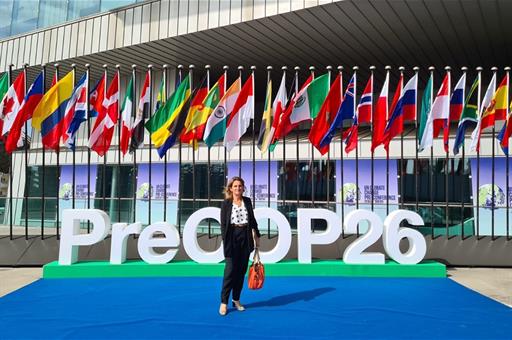PreCOP-26
Pre-Glasgow Climate Summit meeting aims to boost negotiations to close emissions gap and commitments on adaptation and finance
News - 2021.10.1
PreCOP-26, which is being held until tomorrow in Milan (Italy) with the presence of more than 40 countries, brings together environment ministers, as well as representatives of the United Nations Framework Convention on Climate Change (UNFCCC) and civil society actors to discuss key political aspects of the negotiations and to delve into some of the issues that will be addressed at COP26 in Glasgow.
The Third Vice-President of the Government, Teresa Ribera, who has acted as co-facilitator of the discussions on the Loss and Damage Mechanism and adaptation, defended the need for COP26 to give a political response to both mitigation and adaptation objectives and to promote financing for adaptation: "It is essential to increase funding for adaptation needs and match it with funding for mitigation," Ribera said.
Strengthening mechanisms to respond to disasters
In a context of increasing natural disasters, the vice-president explained that it is necessary to "strengthen the mechanisms that allow countries to respond to disasters caused by climate change, while generating a response to achieve better prepared societies, promote adaptation and build resilience", for which she said she has found consensus among delegates to integrate into the response instruments that are now dispersed, such as those dedicated to humanitarian aid or migratory crises.
"To respond to the irreparable losses from the climate impacts we are already suffering, we need a rapid post-disaster response that we are not able to provide now, and we need a mechanism to connect other areas of expertise outside the Paris Accord related to disaster risk management and the capacity to generate rapid response," Ribera stressed.
Likewise, during the meetings, support was shown for maintaining and making the Paris objective of ensuring that the temperature increase is kept within 1.5ºC viable and for reinforcing the Paris commitments with other concrete actions, such as making the timetable for abandoning coal explicit, and the participation of other sectors such as transport or the role of forests as carbon sinks, which will help us to make progress towards the objective. "It is about looking at other approaches, such as nature-based solutions, and other ways of engaging sectorally at a global level to achieve the goals," she said.
In this sense, Ribera insisted that "the objective of climate neutrality by 2050 must be compatible with concrete and ambitious actions in the short term, i.e. by 2030". She recalled that the latest report of the Intergovernmental Panel on Climate Change (IPCC), published last August, has confirmed the acceleration of climate change and the urgency of acting to keep global warming below 1.5ºC, pointing out the possibility of exceeding 1.5ºC in the next decade in one of its scenarios if ambitious policies are not put in place by 2030.
Bilateral meetings
During the two days of sessions, Vice-President Ribera held various bilateral meetings, including with the US Special Climate Envoy, John Kerry, with whom she discussed the outlook for COP26 and the need to make progress on adaptation and a robust transparency and reporting system that makes it easier to know where we are and to fulfil our commitments, and with the President of COP26, Alok Sharma, on the next steps to achieve a successful COP.
On Thursday afternoon, she also participated in the youth plenary, which brought together almost 400 young people from the 197 member countries of the United Nations Framework Convention on Climate Change, where she listened to their proposals for a more just, equal and resilient society.
Non official translation





